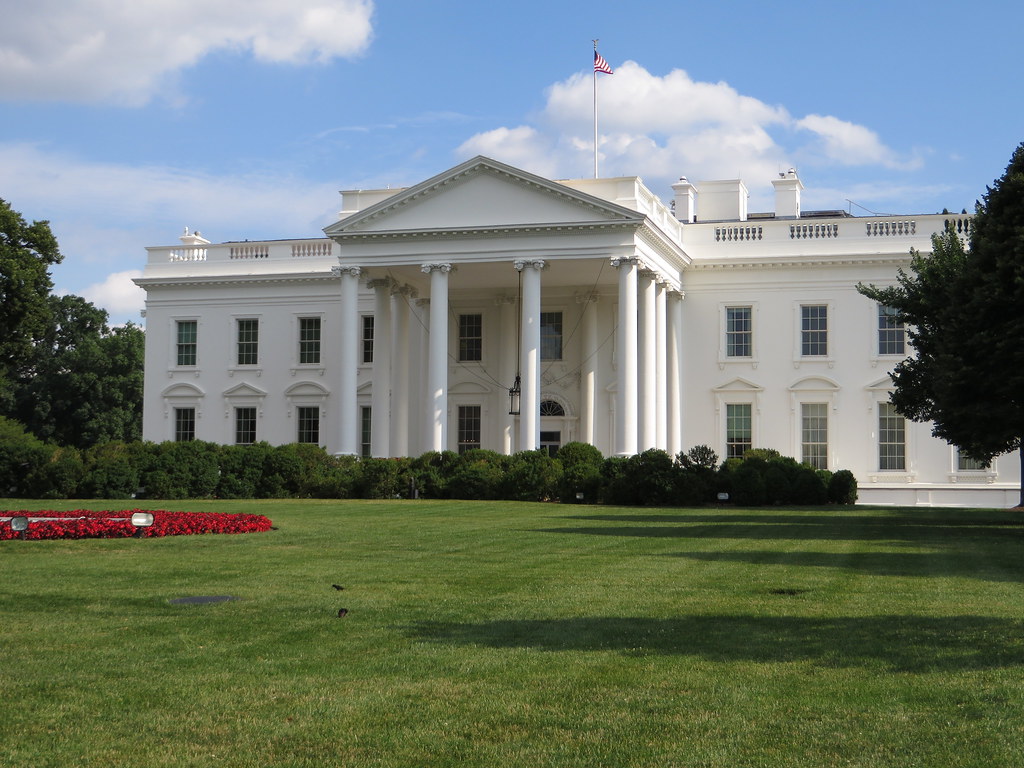Schedule F: An Unwelcome Resurgence
The Trump administration’s 2020 proposal is threatening to make its way back into federal policy. What is Schedule F, and how does it erode national security efforts?

Published by The Lawfare Institute
in Cooperation With

A controversial federal workforce policy from the Trump administration is back in the headlines as the former president and several members of Congress propose resurrecting it in future administrations. Schedule F, proposed in an executive order in October 2020, had attempted to institute radical alterations to the federal civil service by exempting policy-oriented roles from the civil service’s competitive hiring rules and protections around adverse actions such as firing. Just months away from the end of that administration, the plan fizzled after a great deal of frenzied agency activity and negative public scrutiny, but no permanent changes to the federal workforce. President Biden officially rescinded the order in January 2021, stating that career civil servants “are the backbone of the federal workforce” and that it is the policy of the United States to “protect, empower, and rebuild the career federal workforce.”
But the idea stayed alive among former Trump administration officials and, as recently reported by Jonathan Swan of Axios, has become both a key facet of the former president’s plan for a second term and a generally supported position among other 2024 presidential hopefuls in the Republican Party. While some of the policy’s supporters have described their interest as driven by a desire to “hold the D.C. bureaucracy accountable,” others in the former president’s camp are reportedly open about their desire to purge an estimated more than 50,000 civil servant positions and replace these career posts with party loyalists, consistent with the former president’s long-standing frustrations with the career workforce.
At best, implementing Schedule F will undermine the ability of nonpartisan civil servants to pursue their jobs with professionalism and integrity and devalue their capacity to work responsibly across different administrations to carry out vital federal missions. At worst, it will eviscerate the heart of the federal government and its ability to advance and protect the United States’ national interests.
What Is Schedule F?
Executive Order 13957 introduced the new Schedule F employment category in the closing months of the Trump administration. The policy was intended to shift career employees in positions of a confidential policy-determining, policymaking, and policy-advocating character that are not usually subject to change as a result of a presidential transition out of the competitive service, while also “excepting such positions from the adverse action procedures” and the due process normally applied in civil service disciplinary actions. The policy then directed agencies to conduct a first review of which positions would be shifted to Schedule F, to be approved by the agency head or, if needed, by the director of the Office of Personnel Management. Both, notably, are politically appointed roles.
This is a substantial change from long-standing law and principle in the civil service. The Pendleton Act (1883) and the later Civil Service Reform Act (1978) decreed that federal jobs would be awarded on the basis of merit and competition and banned firing civil servants for anything other than proven misconduct and poor performance. These laws, which quashed the spoils system of giving jobs to loyalists, would no longer apply to policy-adjacent personnel under Schedule F. In other words, Schedule F employees could be fired at-will, for any reason, and replaced by anyone the president deems fit, without requiring them to go through the rigorous competitive service hiring process.
Civil service roles that would be subject to Schedule F placement were defined broadly as those that “participate in formulation of policy” or regulations, “[conduct] collective bargaining negotiations,” “supervise attorneys,” work on “deliberations generally covered by deliberative process privilege,” and more. Informal estimates put the target population of Schedule F at 50,000 out of approximately 2 million civil servants.
The stated rationale for Schedule F is that the president must have oversight of the career civil servants in policy roles, who should be expected to display “appropriate temperament, acumen, impartiality, and sound judgment.”
As Jim Eisenmann commented in his Lawfare analysis from late 2020, “[N]o one doubts these maxims” overall. They are a fair description of what citizens and leaders should want civil servants to be. The question is whether a Schedule F policy is necessary to bring such a cadre of federal workers about, whether it would generate more harm than good, and whether, as Eisenmann argues, the very importance of the roles of nonpartisan, experienced civil servant should demand their protection, rather than “replacement by inexperienced current political appointees.”
Both fans and critics of the civil service agree the system is antiquated: Its personnel processes are slow, its pay and classification system needs reform, and its ability to reward performance is constrained. Many Americans live under at-will employment. Why should federal workers be any different? For good reason, particularly in the field of national security.
Best-Case Scenario: Weakening the Civil Service Risk Management Role
Over 2 million career civil servants working across dozens of large and small agencies are hired under the competitive service process. More than 70 percent work in national security-oriented agencies, such as the Defense Department, the State Department, the Treasury Department, and the Energy Department. Many more work in technical, administrative, policy, and legal roles. They do work that often results in news that makes headlines—negotiating sanctions policies, advising on the legality of drone strikes overseas, maintaining relationships with allies and partners, preparing procedures and resources for future pandemic response—and a great deal more behind the scenes that may end up on a cabinet secretary’s or president’s desk for consideration.
Author Michael Lewis describes civil servants’ responsibilities in the “The Fifth Risk,” calling the U.S government the manager of “the biggest portfolio of [catastrophic] risks ever managed by a single institution in the history of the world.” Some are obvious—the threat of nuclear attacks, for example—but most are glacial and opaque, demanding a portfolio of reliable and steady risk managers who can prioritize the nation’s security without fearing for their job security.
Thousands of such “risk managers” who work in policy-adjacent roles would be implicated by a Schedule F policy that removes the civil service protections set out for them in the Civil Service Reform Act of 1978. Civil servants today are protected against possible political retaliation, coercion, or removal by presidents and political appointees. They must be hired on the basis of relative ability, knowledge, and skills, using fair evaluation metrics. And they are protected against reprisal for whistleblowing.
These rules are frequently shorthanded derisively in (false) assumptions that civil servants cannot be fired. To the contrary, there are set guidelines for when federal employees can be lawfully terminated and disciplined based on performance or misconduct. The antiquated federal hiring process faces similar—albeit fairer—criticism, but its slowness is intended to screen for those who have “a high standard of integrity and trust to promote the interests of the public” and for good reason. Overall, these critiques misunderstand that the competitive hiring process and subsequent protections are what make it possible for civil servants to perform exceptionally, particularly in high pressure, complex policy areas where the government is managing extreme risk on behalf of the country, such as national security.
By protecting them from political reprisal, these rules give civil servants in policy roles the foundation to offer advice that may be tough for presidents to hear, to execute policies with high stakes, to report illegal activity and misconduct as a part of their duties, and to trust that they and their peers owe their first fealty to protecting and defending the Constitution. They do all of this with the confidence that their integrity will be rewarded and protected.
At best, shifting policy-aligned roles to Schedule F roles would have a chilling effect on such policy experts whom we rely on for their unique expertise, candor, and integrity, potentially making them more cautious about the advice they give, the portfolios they support, the risks they take in defending the Constitution, and their willingness to call out malfeasance or bad news.
Worst-Case Scenario: Harming National Security
At its worst, Schedule F will make it possible for presidents to remove thousands of experts who make U.S. global leadership possible. By shifting protected civil servants to at-will employees, Schedule F makes it possible to fire them without the due process currently owed to civil servants. In other words, civil servants could be fired for any reason at all—for giving unwelcome advice, for prior jobs, for being the subject of unsubstantiated accusations of any type, for perceptions of partisan affiliation, or simply for being in a role the president wishes to open up for a loyalist.
Some Schedule F advocates make clear that large-scale removals are under consideration and that removal, not oversight, is their ultimate goal for Schedule F. “Fire everyone you’re allowed to fire,” one commented, according to the Axios reporting. “And [then] fire a few people you’re not supposed to, so that they have to sue you and you send the message.”
Because the policy would also allow replacement of current civil servants without a competitive process, replacements for nonpartisan civil servants could be made without regard to qualification and suitability, or based on partisan affiliation, creating a new kind of political appointee.
The potential loss of talent could be wide and extremely damaging. Axios also reported that, according to sources close to Trump, the former president intends to “go after” the national security establishment as a matter of “top priority,” including those in the intelligence community and State Department. Policy roles that could be reclassified as Schedule F could cut across many high-import areas: Russian defense strategy, Iranian nuclear programs, or Chinese regional security capabilities, among hundreds of other categories. The harm to national security of removing and replacing civil servants—whose work, as we have established, requires expertise, relationships, and clear understanding of risk—with individuals with no required qualification except loyalty to a single individual is self-evident.
But, should a future president pursue this action, beyond missing an endless list of risk portfolio managers, the United States will miss something more fundamental to its success and security: its reliability. American alliances are valuable because of the steady undercurrent of the nation’s civil servants who maintain networks, expertise, and consistency regardless of who inhabits the Oval Office. Despite its turmoil, the American political system is a strong model and international interlocutor because its civil servants serve expertly and well across presidential administrations of any political affiliation. Schedule F, by stifling or removing long-serving civil servants, would make the United States a weaker, less reliable, and less trusted partner.
Why Shouldn’t the President Get a Say?
A president’s desire to shape a policy team, and to be sure it is filled with strong performers who are closely aligned with their views, is understandable. After all, presidents are elected to implement their chosen policy agenda, and having a team around them who can work in support is critical. But presidents already can wield enormous influence over both their closest policy advisers and the most far-flung agency overseers: through the 4,000 political appointees who are named, or removed, at the pleasure of the president. The Schedule F proposal would be an enormous and unnecessary expansion of this already poorly utilized system.
Most administrations never come close to seeing all those politically appointed policy roles filled despite the tremendous access and leverage such appointments bring them. And some presidential teams still struggle to make best use of political appointee and career civil servant partnerships. Rather than adding more chaos and instability with a Schedule F policy, administrations could be maximizing the opportunity that comes with leveraging their career and political leaders together. As noted in a recent Partnership for Public Service and Boston Consulting Group report:
Career executives bring program and policy expertise from their long familiarity with their agencies which can help them manage programs better and work more effectively with external stakeholders and inside actors. Politically appointed leaders can bring energy, risk-taking and responsiveness into an agency’s decision-making process which can improve performance. When leaders are matched with missions, agendas and teams that align with their distinct approaches and perspectives, they can find success in creating a government that is more efficient, innovative and responsive to the needs of the public.
The civil service system is not perfect. The pay system has its origins in World War II. The hiring process, though well-intended, is glacial. The permeability of the system in an era that requires close understanding and collaboration across sectors is limited. But the fundamentals are powerful, and they serve as a critical ingredient to the success of the United States’ global leadership and the sustainability of its democracy.
The U.S. government is able to take on high-risk, high-cost ventures—nuclear security, pandemic response, environmental clean-up, food safety, and more—because civil servants are hired based on qualifications, not party affiliation; give advice based on data and integrity, not fear of reprisal; and owe allegiance to the Constitution, not the president. It needs to stay that way.





